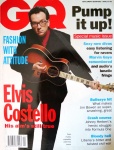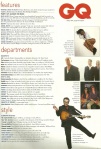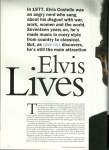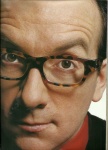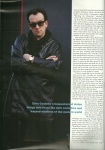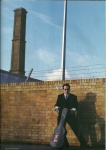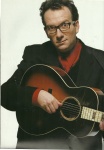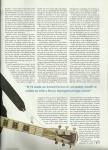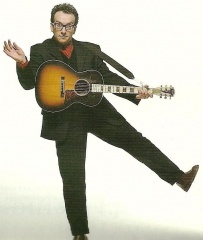British GQ, April 1994: Difference between revisions
(formatting, update image links) |
(+more text) |
||
| Line 25: | Line 25: | ||
We all project our own meanings onto pop songs, though perhaps more so with Costello's than most. This is partly because their fabric is unusually suggestive, partly because Ins own identity - the "Real Elvis Costello". that sort of guff - has remained heavily concealed. Autobiography enters his material only peripatetically and then usually undetectably. He is about as given to public confession as government ministers are to monogamy. But the emotion that seemed to drive his earliest endeavours was anger, anger, anger. | We all project our own meanings onto pop songs, though perhaps more so with Costello's than most. This is partly because their fabric is unusually suggestive, partly because Ins own identity - the "Real Elvis Costello". that sort of guff - has remained heavily concealed. Autobiography enters his material only peripatetically and then usually undetectably. He is about as given to public confession as government ministers are to monogamy. But the emotion that seemed to drive his earliest endeavours was anger, anger, anger. | ||
His first efforts were released by | His first efforts were released by Stiff Records, a west London independent label dedicated to advancing the cause of rock 'n' roll individualists of a type scorned by the major companies: Ian Dury, Reckless Eric, Nick Lowe. Another. Declan MacManus, had been earning a crust as a computer operator at the Elizabeth Arden cosmetics factory in Ealing by day composing alone and playing with scratch bands by night. Uniformly spurned by the musical establishment and justifiably embittered, he got his first break after giving an office audition to Stiff boss and entrepreneur Dave Robinson. | ||
Between them, they dreamed up MacManus. stage name. "Costello". after the singer's mother's maiden moniker; "Elvis" to wind people up. His first single was "Less Than Zero". a loathing critique of the psychology of the National Front. It appeared on, but did not typify, the ensuing ''My Aim Is True'', which was more concerned with girls and the problems they seemed to present for the prickly Other Elvis. The album's roaring success was quickly consolidated by ''This Year's Model'', which introduced the stylised, febrile sound of The Attractions, a distinctive mix of punk attack and pop confection. An anti-star was born. | |||
Costello approached the concert circuit with concentrated rancour. Two shows stick in my mind. The first was on a Stiff ensemble tour (pre-Attractions) in Guildford. A handful of herberts had been assaulting the stage with broken glass and phlegm. Costello beetled on to do his slot: "I see we've got some cunts in the audience tonight." he snarled. No more broken glass and phlegm. The second was a headlining ''This Year's Model'' tour gig in Canterbury where the Costello set created an atmosphere of such admiring antipathy that he and the band had to be locked in the dressing room for their own safety. He remembers that one: "You think back on it now and it was all about nothing really. It was, like, we didn't do an encore." | |||
Wryly, he recalls: "There was quite a lot of that, actually I was just wound up. Some of it was righteous, some of it got to be, like, a thing you did, you know. The danger of any kind of angry behaviour is that it becomes a habit. It becomes your act: you're him: be angry! It's the problem some comedians have when they can't stop telling jokes." | |||
A third album, ''Armed Forces'' (1979), distinguished by its dissident socio-political sentiments, confirmed Costello as the class act of the New Wave and the hand crash-landed onto the global market. A widespread misconception of the time was that these were the kind of thinking pop boys who didn't | |||
{{cx}} | {{cx}} | ||
Revision as of 16:26, 24 April 2013
|
